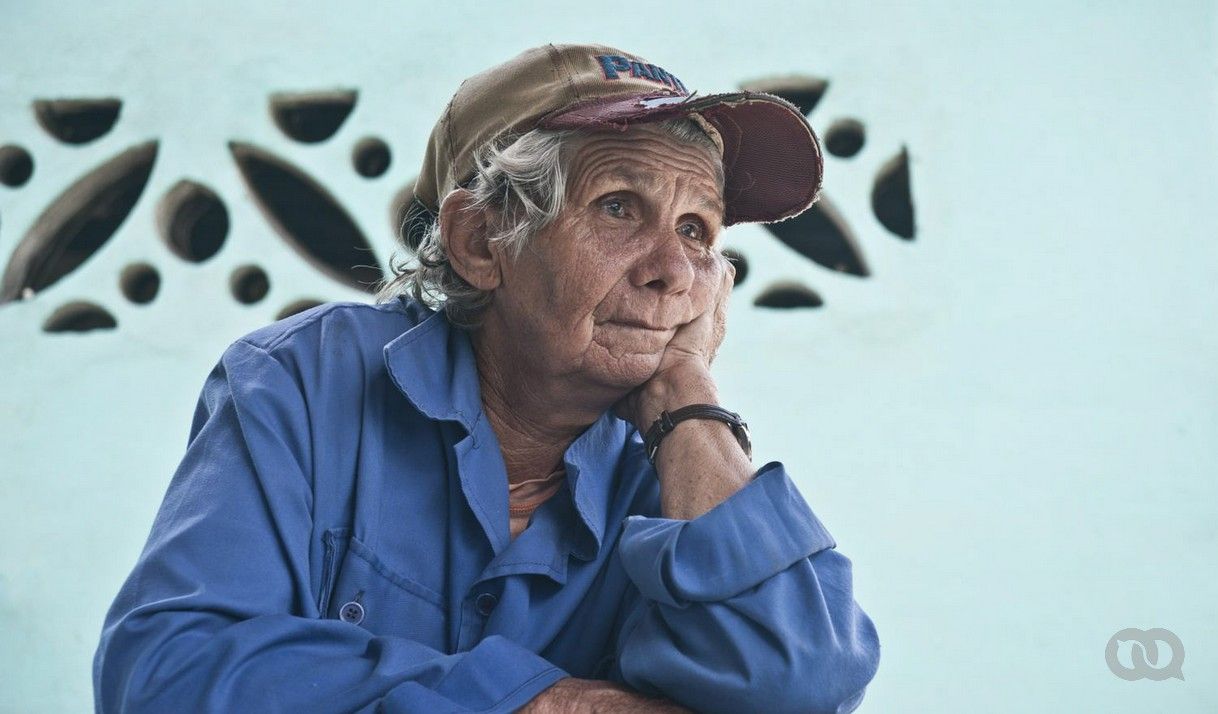What’s it like to grow old in Cuba today? Poverty, loneliness, and abandonment are part of the reality experienced by the over-65 population on the island.
“The Old Age We Never Expected” is the title of the book published in September 2023 by the project “Cuido60, Observatory of Aging, Care, and Rights”. The volume compiles images and stories about experiences of old age that were awarded in the first two editions of the “Looking at Old Age” contest (2022 and 2023), which recently opened its third call for submissions.
“And here I am, sixty-two years after that first of January 1959, at over 70 years old, thinking that, economically speaking, things haven’t been so bad for me, especially because I’ve been able to ensure that my two children have studied and have a profession that should help them move forward, but with the terrible disappointment that it wasn’t this country, destroyed socially, economically, and morally, the one I dreamed of leaving to them and my grandchildren,” writes Ines Caridad Casal, author of one of the stories in the book.
Challenges of Aging in Cuba Today
“My generation, over 60 years old, has always lived in difficult conditions. (…) Today, in addition to the scarcity of food, rampant inflation, we are experiencing a serious lack of all kinds of medicines and a total abandonment of any essential services to have a normal life. (…) In this context, the elderly have been severely hit, especially those who are alone, isolated, forgotten anywhere in the country,” narrates Teresa Diaz Canals, an author included in the anthology.
Most of the photographs and stories collected in the book reflect old age in the current context as a stage of decline, loss, and deficits. The absence of artistic and narrative constructions expressing so-called healthy aging — a process by which people can develop their potential with dignity and equality — is notable. On the contrary, being elderly in Cuba is associated with dependency and vulnerability, assures Elaine Acosta, editor of the work, in the volume’s introduction.
Acosta, who is also the executive director of Cuido60, adds that the book unintentionally compiles the breadth of topics related to the situation of the elderly in Cuba and the need for urgent changes in social policies aimed at that population group.
Among the difficulties faced by the elderly are material shortages and unsatisfied basic needs; demands for care and attention; emotional, psychological, and social well-being; the food crisis; inflation; and loss of financial autonomy due to the loss of pensions’ purchasing power.
Two of the most urgent problems faced by those reaching old age on the island are linked to the deteriorated general situation plus the migratory crisis — phenomena that have increased considerably in recent years.
“At park benches, elderly people abandoned to their fate gather for hours, waiting for some charitable passerby to help them alleviate the terrible situation in which they survive momentarily. Under the relentless sun, dehydrated, hungry, in terrible hygienic conditions, they spend most of the day just a few meters from the provincial Government headquarters, which turns a blind eye and “washes its hands”, reneging on its responsibilities of care and attention to those who, in other times, dedicated their effort and work to build a State in which, supposedly, ‘no one would be abandoned’,” narrates Fidel Gomez Güell in one of the stories.
The migratory crisis has profoundly impacted the lives of the elderly in Cuba in the last three years, considering that around half a million Cubans —mostly young people— have emigrated and left behind parents and grandparents.
As Acosta points out, the migratory exodus further complicates the care crisis by increasing the deficit of family caregivers and putting the unsustainable pension system at risk. To the material hardships suffered by older people is added the weakening of family and social networks, the lack of support and care, and higher levels of loneliness.
The text “The Farewell of a Hug”, by Rachel Pereda, captures the feelings of many young Cubans who, when leaving, left their elders behind:
“My grandmother hates goodbyes. But no one escapes them, especially not in Cuba, the country of endless farewells… That afternoon of farewells, my grandmother made cornmeal with fried egg, the food I loved so much as a child. We had lunch together in the courtyard, at the same table where in a distant past I learned to read and write. The ghost of old family parties also sat beside us. Now my grandmother lives alone, accompanied by the memories that inhabit the walls of an old and lonely house. Before we left, I hugged her with all my strength. In that broken hug, something broke in me forever”.
The Contest
Cuido60 seeks to improve accessibility and the quality of information on the situation and rights of older people and their caregivers. It also aims to make visible and support the work of community organizations and civil society offering care and attention services to people over 65 years old. As part of the strategy, the “Looking at Old Age” contest emerged.
The call for submissions for the 2024 edition of the competition is open in the categories of photography, stories, and short audiovisuals about experiences of old age in Cuba. The best works may become part of Cuido60’s books, projects, and social networks. The top three winners will receive cash prizes.
Proposals can be submitted until March 10, 2024, and the results will be announced on April 15. The Observatory of Aging, Care, and Rights believes that the contest is a unique opportunity for participants to showcase their talent and also contribute to highlighting the importance of old age in society.
“This call is an open invitation to all Cubans, inside and outside the island, but especially directed at Cuban seniors. We want to hear their voices. We will especially value works done by older adults, whether independently or in collaboration with a family member or friend,” the Observatory notes.
Cuido60 was founded in May 2021 as a project to expand links between academia and society, and to generate and socialize diverse information regarding aging and care. It works with a human rights, gender, and intergenerational approach and promotes a democratic reorganization of care and welfare in Cuba and the region.
Note from Cuido 60: “Details about the new edition can be found on the website (https://www.cuido60.com). For specific information, researcher Alejandra Lache is available via email: [email protected]".
This article was translated into English from the original in Spanish.


If you believe that our journalism is important for Cuba and its people, we want you to know that this is a critical moment.
Behind each publication there is a team that strives to ensure that our products meet high quality standards and adhere to professional and ethical values.
However, to keep a close watch over government, demand transparency, investigate, analyze the problems of our society and make visible the hidden issues on the public agenda is an effort that requires resources.
You can contribute to our mission and that is why today we ask for your help. Select the way you prefer to send us a donation.









comments
We moderate comments on this site. If you want to know more details, read our Privacy Policy
Your email address will not be published. Mandatory fields are marked with *